硕士论文答辩sharing economy 共享经济商业模式 (汽车共享)
2020年最新关于共享经济的英语作文
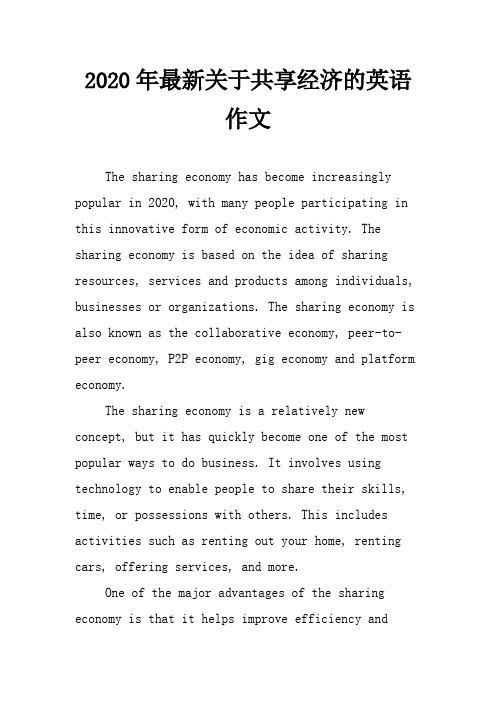
2020年最新关于共享经济的英语作文The sharing economy has become increasingly popular in 2020, with many people participating in this innovative form of economic activity. The sharing economy is based on the idea of sharing resources, services and products among individuals, businesses or organizations. The sharing economy is also known as the collaborative economy, peer-to-peer economy, P2P economy, gig economy and platform economy.The sharing economy is a relatively new concept, but it has quickly become one of the most popular ways to do business. It involves using technology to enable people to share their skills, time, or possessions with others. This includes activities such as renting out your home, renting cars, offering services, and more.One of the major advantages of the sharing economy is that it helps improve efficiency andreduce costs by eliminating the need for middlemen. The sharing economy can also help to create jobs, as people are able to monetize their skills or possessions. In addition, the sharing economy has been credited with providing access to goods and services that would otherwise be unavailable or too expensive.The sharing economy also has its drawbacks. For example, there can be issues around quality control and safety, as well as concerns about how companies handle data. Additionally, some worry that the sharing economy could lead to the exploitation of workers, as companies may use the platform to pay less than minimum wage.Despite these challenges, the sharing economy has become an integral part of our lives. As the world continues to embrace the sharing economy, we can expect to see even more innovative ways to share resources and services, as well as increased consumer choice. So, while there may be some challenges to address, the sharing economy islikely here to stay.。
共享经济的英语作文
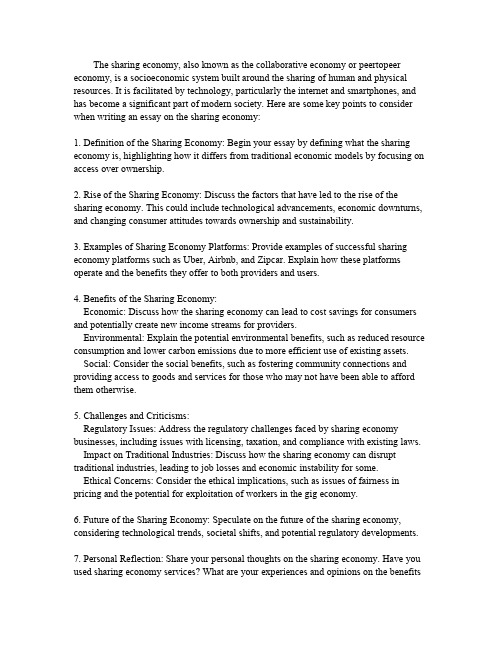
The sharing economy,also known as the collaborative economy or peertopeer economy,is a socioeconomic system built around the sharing of human and physical resources.It is facilitated by technology,particularly the internet and smartphones,and has become a significant part of modern society.Here are some key points to consider when writing an essay on the sharing economy:1.Definition of the Sharing Economy:Begin your essay by defining what the sharing economy is,highlighting how it differs from traditional economic models by focusing on access over ownership.2.Rise of the Sharing Economy:Discuss the factors that have led to the rise of the sharing economy.This could include technological advancements,economic downturns, and changing consumer attitudes towards ownership and sustainability.3.Examples of Sharing Economy Platforms:Provide examples of successful sharing economy platforms such as Uber,Airbnb,and Zipcar.Explain how these platforms operate and the benefits they offer to both providers and users.4.Benefits of the Sharing Economy:Economic:Discuss how the sharing economy can lead to cost savings for consumers and potentially create new income streams for providers.Environmental:Explain the potential environmental benefits,such as reduced resource consumption and lower carbon emissions due to more efficient use of existing assets. Social:Consider the social benefits,such as fostering community connections and providing access to goods and services for those who may not have been able to afford them otherwise.5.Challenges and Criticisms:Regulatory Issues:Address the regulatory challenges faced by sharing economy businesses,including issues with licensing,taxation,and compliance with existing laws. Impact on Traditional Industries:Discuss how the sharing economy can disrupt traditional industries,leading to job losses and economic instability for some.Ethical Concerns:Consider the ethical implications,such as issues of fairness in pricing and the potential for exploitation of workers in the gig economy.6.Future of the Sharing Economy:Speculate on the future of the sharing economy, considering technological trends,societal shifts,and potential regulatory developments.7.Personal Reflection:Share your personal thoughts on the sharing economy.Have you used sharing economy services?What are your experiences and opinions on the benefitsand drawbacks?8.Conclusion:Summarize the main points of your essay,reiterating the significance of the sharing economy in contemporary society and the potential it has to shape the future of economic transactions.Remember to structure your essay with a clear introduction,body paragraphs that explore each point in detail,and a conclusion that ties everything e evidence and examples to support your arguments and make your essay engaging and informative.。
共享经济英文议论作文
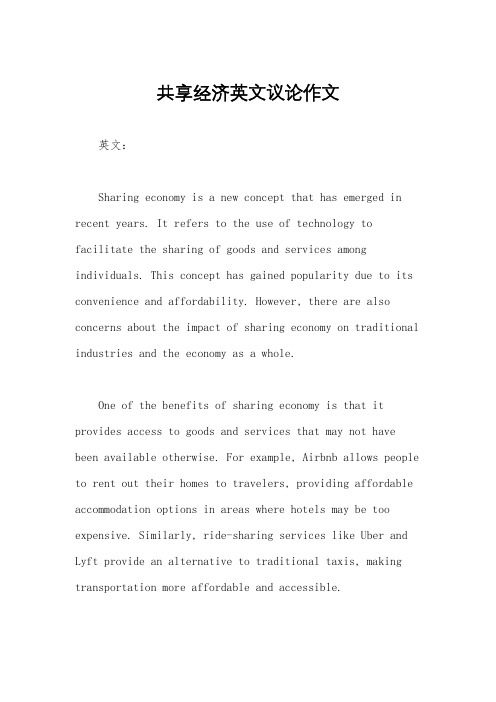
共享经济英文议论作文英文:Sharing economy is a new concept that has emerged in recent years. It refers to the use of technology to facilitate the sharing of goods and services among individuals. This concept has gained popularity due to its convenience and affordability. However, there are also concerns about the impact of sharing economy on traditional industries and the economy as a whole.One of the benefits of sharing economy is that it provides access to goods and services that may not have been available otherwise. For example, Airbnb allows people to rent out their homes to travelers, providing affordable accommodation options in areas where hotels may be too expensive. Similarly, ride-sharing services like Uber and Lyft provide an alternative to traditional taxis, making transportation more affordable and accessible.However, the rise of sharing economy has also raised concerns about its impact on traditional industries. For example, the hotel industry has been affected by the rise of Airbnb, as more people choose to stay in private homes rather than hotels. This has led to calls for regulation of sharing economy platforms to ensure a level playing field.In addition, there are concerns about the impact of sharing economy on the overall economy. Some argue that sharing economy platforms are contributing to the growth of the gig economy, where workers are hired on a short-term or freelance basis, without the benefits and protections of traditional employment. This could lead to a widening income gap and a decline in the standard of living for workers.In conclusion, sharing economy has both benefits and drawbacks. While it provides access to affordable goods and services, it also raises concerns about its impact on traditional industries and the economy as a whole. It is important for policymakers to carefully consider the implications of sharing economy and develop regulationsthat promote fairness and protect workers.中文:共享经济是近年来出现的一个新概念。
共享经济的利与弊英文作文
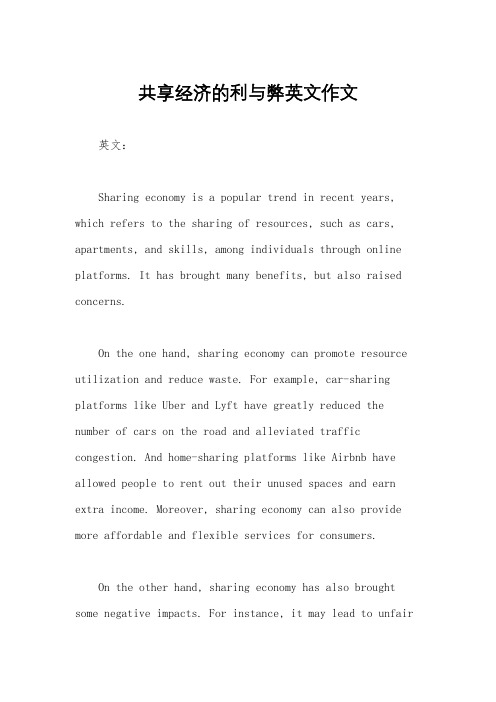
共享经济的利与弊英文作文英文:Sharing economy is a popular trend in recent years, which refers to the sharing of resources, such as cars, apartments, and skills, among individuals through online platforms. It has brought many benefits, but also raised concerns.On the one hand, sharing economy can promote resource utilization and reduce waste. For example, car-sharing platforms like Uber and Lyft have greatly reduced the number of cars on the road and alleviated traffic congestion. And home-sharing platforms like Airbnb have allowed people to rent out their unused spaces and earn extra income. Moreover, sharing economy can also provide more affordable and flexible services for consumers.On the other hand, sharing economy has also brought some negative impacts. For instance, it may lead to unfaircompetition and tax evasion. Some sharing economy platforms do not comply with regulations and do not pay taxes, which may harm the interests of traditional businesses and the government. Additionally, sharing economy may also raise privacy and security concerns, as people need to sharetheir personal information and belongings with strangers.In my opinion, sharing economy is a double-edged sword. It can bring many benefits, but also pose challenges and risks. Therefore, we need to strike a balance between innovation and regulation, and ensure that sharing economy operates in a fair and responsible manner.中文:共享经济是近年来的一个流行趋势,它指的是通过在线平台在个人之间共享资源,如汽车、公寓和技能。
共享经济英文作文150

共享经济英文作文150英文:Sharing economy is a new business model that has gained popularity in recent years. It is a system in which individuals can share their resources with others for a fee. This can include anything from renting out a spare room on Airbnb to sharing a car on Uber.The sharing economy has many benefits. It allows people to make extra money by sharing their resources. It also provides a more affordable alternative for consumers. For example, instead of paying for an expensive hotel room, a traveler can rent a room from a local resident for afraction of the cost.However, there are also some drawbacks to the sharing economy. One concern is safety. When using a sharing economy platform, it can be difficult to determine whether the person you are dealing with is trustworthy.Additionally, there may be issues with insurance andliability if something goes wrong.Overall, the sharing economy has its pros and cons. It can be a great way to save money and make extra income, but it is important to use caution and be aware of thepotential risks.中文:共享经济是近年来流行起来的一种新的商业模式。
论共享经济英语作文

论共享经济英语作文The Rise of the Sharing Economy。
In recent years, the concept of the sharing economy has gained significant momentum, revolutionizing the way people consume goods and services. The sharing economy, also known as collaborative consumption, is a socio-economic system built around the sharing of human and physical resources. This trend has been largely driven by the rise of digital platforms, which have made it easier for individuals to connect and share resources with one another. In this essay, we will explore the benefits and challenges of the sharing economy, as well as its potential impact on society.One of the key benefits of the sharing economy is its potential to reduce waste and promote sustainability. By sharing resources such as cars, homes, and tools,individuals can make more efficient use of existing assets, reducing the need for new production and consumption. This not only helps to minimize environmental impact, but alsoallows people to save money and access goods and services that they may not be able to afford on their own. For example, car-sharing services like Zipcar and Turo allow individuals to rent vehicles on an as-needed basis, reducing the need for personal car ownership and the associated costs and environmental impact.Furthermore, the sharing economy has the potential to create new economic opportunities and empower individuals. Through platforms like Airbnb and Uber, people can generate income by renting out their homes or providing transportation services. This has allowed many individuals to supplement their income or even turn sharing into afull-time business. Additionally, the sharing economy has the potential to provide access to goods and services in underserved communities, bridging the gap between supply and demand in areas where traditional businesses may not operate.However, the sharing economy is not without its challenges. One of the main concerns is the potential for exploitation and inequality. As the sharing economy relieson individuals to provide goods and services, there is a risk that workers may be exploited or underpaid, especially in the absence of traditional labor protections and regulations. Additionally, the rise of sharing economy platforms has raised questions about issues such as data privacy, consumer protection, and the impact on traditional industries. For example, the rise of ride-sharing services has led to conflicts with traditional taxi companies and regulatory challenges in many cities.In conclusion, the sharing economy has the potential to bring about significant social and economic benefits, from promoting sustainability and reducing waste to creating new economic opportunities and empowering individuals. However, it also presents challenges that need to be addressed, such as ensuring fair labor practices and protecting consumer rights. As the sharing economy continues to evolve, it will be important for policymakers, businesses, and individuals to work together to ensure that it is harnessed for the greater good of society. Only then can the full potential of the sharing economy be realized.。
共享经济看法英语作文
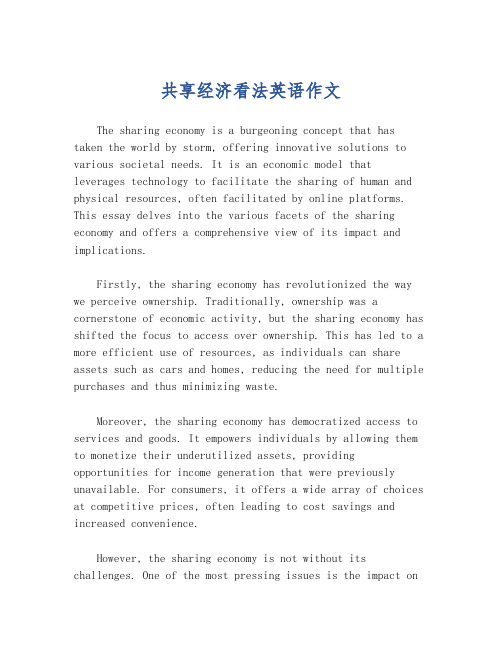
共享经济看法英语作文The sharing economy is a burgeoning concept that has taken the world by storm, offering innovative solutions to various societal needs. It is an economic model that leverages technology to facilitate the sharing of human and physical resources, often facilitated by online platforms. This essay delves into the various facets of the sharing economy and offers a comprehensive view of its impact and implications.Firstly, the sharing economy has revolutionized the way we perceive ownership. Traditionally, ownership was a cornerstone of economic activity, but the sharing economy has shifted the focus to access over ownership. This has led to a more efficient use of resources, as individuals can share assets such as cars and homes, reducing the need for multiple purchases and thus minimizing waste.Moreover, the sharing economy has democratized access to services and goods. It empowers individuals by allowing them to monetize their underutilized assets, providing opportunities for income generation that were previously unavailable. For consumers, it offers a wide array of choices at competitive prices, often leading to cost savings and increased convenience.However, the sharing economy is not without its challenges. One of the most pressing issues is the impact ontraditional industries. The disruption caused by sharing platforms has led to job losses and economic displacement in sectors like hospitality and transportation. Additionally, there are concerns about the lack of regulation and oversight, which can lead to issues such as safety, privacy, and fair competition.Furthermore, the environmental impact of the sharing economy is a double-edged sword. While it promotes theefficient use of resources, there is also a risk of increased consumption and waste if not properly managed. The sharing economy must strive for sustainable practices to ensure thatit contributes positively to environmental conservation.In conclusion, the sharing economy presents a paradigmshift in how we approach consumption and ownership. It offers numerous benefits, such as increased efficiency,accessibility, and economic opportunities. However, it also presents challenges that must be addressed through thoughtful regulation and sustainable practices. As the sharing economy continues to evolve, it is crucial for stakeholders to work together to harness its potential while mitigating its drawbacks.。
共享经济作文 英文

共享经济作文英文英文:Sharing economy is a new trend in the world of business. It is a type of economy where individuals share their resources with others, usually through online platforms. This type of economy has been growing in popularity in recent years due to its many benefits.One of the benefits of sharing economy is that it is cost-effective. For example, instead of buying a car, I can use a car-sharing service to rent a car when I need it.This saves me money on car payments, insurance, and maintenance. Another benefit is that it promotes sustainability. By sharing resources, we can reduce waste and conserve natural resources.However, there are also some challenges to sharing economy. One challenge is that it can be difficult to regulate. Since sharing economy is often based on peer-to-peer transactions, it can be hard to ensure that allparties are following the rules. Another challenge is thatit can lead to job loss in certain industries. For example, if people start sharing cars instead of buying them, it could lead to a decrease in car sales and job losses in the automotive industry.Overall, I believe that sharing economy is a positive trend. It has the potential to save people money, promote sustainability, and foster a sense of community. However,it is important to address the challenges and ensure that sharing economy is regulated in a fair and effective manner.中文:共享经济是商业世界中的一种新趋势。
- 1、下载文档前请自行甄别文档内容的完整性,平台不提供额外的编辑、内容补充、找答案等附加服务。
- 2、"仅部分预览"的文档,不可在线预览部分如存在完整性等问题,可反馈申请退款(可完整预览的文档不适用该条件!)。
- 3、如文档侵犯您的权益,请联系客服反馈,我们会尽快为您处理(人工客服工作时间:9:00-18:30)。
SHARING ECONOMY BUSINESS MODEL AND VALUE CREATING Case study on car-sharingSihui ZHAOPEG3 Classique Graduate levelMaster in ManagementProfesseur Tutor: FOX-MURATON Melissa29/01/2015TABLE OF CONTENT⏹ Research Context⏹ Research Objective⏹ Methodology⏹ Structure of thesis⏹ Findings⏹ ConclusionPeer-to-Peer EconomyRESEARCHCONTEXTcollaborative consumptionRelationship economyAccess EconomySharing EconomyWHAT?Economic model based on “Access to” rather than “Ownership of” physical and human assets like time, space and skills.They make use of idle assets and create new marketplaces.Sharing EconomyIn other word, it involves using online platform and internet technology as tools to connect distributed groups of people to match millions of haves with millions of needs, immediately and efficiently.MODEAIMWHERE?Sharing EconomyWHY?Peer to peer payment systems Reduced transaction costs Peer to peer social networking Innovative mobile technologiesDRIVERS OF SHARING ECONOMYIncreasing Population Density Need for more Resources Desire for community Consumerist Culture7 times more devices than people by 2020Monetize Excess or Idle InventoryIncrease Financial Flexibility Access Over Ownership Influx of VC Funding$ 2.46 billion funding inSharing economy startups in the last 7 MONTHSWorld population will be 9.3BILLION by 2050DRIVERS: T. E. S.Opportunities in Car Sharing 2020: Carsharing to emerge as additional business opportunity for automotive manufacturer for customer retention and long term sustainabilityGlobal Carsharing Outlook, Number of Members and Vehicles, 2006-2014(Source: Frost and Sullivan)Carsharing Market:Carsharing Vehicles and Members Growth, Global, 2010–2020① MemberCarsharing subscriber base to be 14 Million in EU by 2020200,000 shared vehicles expected in Europe by 2020France, United Kingdom, Germany and Switzerlandto hold around 75% of revenue share in 2016By 2016, 1 in 5 vehicles of the carsharing vehicle fleet is expected to be a battery powered EVThe revenue potential of carsharing market is expected to be €7 Billion by 2020 in EuropeVehiclePotential MarketUsage of Electric VehicleRevenue Generation⑤② ③ ④WHO?Communication technology supportCommunicationtechnology supportCUSTOMERCUSTOMER PARTICIPANTsprovides a new way of thinking about business, exchange, value and community. Enabled by internettechnologiesConnecting distributednetworks of peopleand/or assets(Mine,yours, ours)Making use of the idling capacity oftangible and intangible assetsEncouragingmeaningfulinteractions and trustEmbracing openness,inclusivity and thecommonsThe sharing economy CharacteristicsRESEARCH OBJECTS This study conducted exploratory and descriptive research on the innovation business model of Car-sharing to gain an well understanding of how such emerging consumption business model are shaped and how value creation it producesTo develop an understanding of the different between Traditional car consumption and Car-sharing consumptionmodel.To identify Car-Sharing Value Creation by NICEframeworks;To recognize the appropriate methods when applies Car-sharing value; from business, operation and customer strategyviews;Specific objectives of the study contain :M E T H O D O L O G YIntegrated Theory: Business Model Design; Value creation;Data collection; Data reduction; Data analysis;Theory StudyResearch ObjectiveEmpirical DataPrimarily problemGenerative modelBusiness model:key choices, components, ecosystem, environment, innovation elementsValue creation: Value chain,Value framework•Actors•Relationship •Mechanisms •Environment •ChallengeFind the way to answer research questions posed by the research: •What are the activities, entities, processes, and forces and the contexts that influenced, enabled, or constrained car-sharing?•What are the opportunities for the new comers to car-sharing? What the strategic options for the companies? What the market situation and thecontext of the car-sharing business?•What’s the core value of car-sharing and what the value creation model based on the car-sharing business? Who are the key players and components incarsharing business?•How to operate with outstanding execution underlying good idea? What are the correspondent strategies to figure out the challenges?S T R U C T U R E O F T H E S I SThe theory research of sharing economy development and theapplication of sharing economy business modelValue net model ofsharing economy business modelTheory studyModel frameworkBusiness modelCase studyFinding &ConclusionHow does sharing economy business model succeed in performing value creating and implementing in car-sharing business?Study ObjectiveSharing economyValue netCase studyValue creationBusiness modelstrategyValue model of car-sharing businessContextAnalysis of findings; conclusion and suggestionQuestionFINDINGFINDINGSThe car-sharing business model innovation is based on the role transformation of customers.CUSTOMERMARKETPROCESS OTHERPARTICIPANTSPRODUCT OR SERVICESOCIAL ENVIRONMENTService innovation;Potential bargain space;Collaborative consumption;Characteristics;access over ownershipBased on the internet and network terminal;No boarder of the transaction time and place;Customer driverAccurate market segmentation Car-sharing;ride-sharing; mobility-sharing;redistribution; Long life timeTransaction activity between individuals;Needs and haves self-match systemTransaction online platform;social networking services;credit supervisoryorganization; partnership;terminal manufacturerSustainable consumption;Sharing spiritCUSTOMERMARKETPROCESS OTHERPARTICIPANTSPRODUCTOR SERVICESOCIALENVIRONMENTMARKETPLACEPRODUTSSERVICEProvide a platform Company as a serviceMotivate a marketplace Sharing economyCustomer-Oriented0 0.511.522.533.544.5O f f e r i n g L e v e lCompeting Factors Traditional transportation Traditional car renting Car/Ride-sharing•Novelty- adopt innovative content, structure or governance•Lock-In – build in elements to retain business model stakeholders•Complementarities – bundle activities to generate more value•Efficiency– reorganize activities to reduce transaction costsCustomer is the core value source of the sharing economy business and it is the motivator and revolutionary of the newconsumption model.First, customer has more initiatives and each one could be the potential provider and user. Customer owns value, deliver value,create value andmaintain value.Second, Most of thecar-sharing companiesbegin to act as amediator or aplatform to match theneeds and haves.Third, the ecosystemof the car-sharingbusiness has thenature of trustestablishing.C O N CL USI ONTraditional company managers and star-ups directors, who want to share a cake in thesharing economy market, will benefit from the studyThe study’s focus on sharing economy development highlights the new consumption mode and motivates the sustainable economic seeking in the future. The sharing economy seeks to dig out the new consumption model by unlocking the value of idle and redistribution the social resources more sustainably.T H A N K S。
